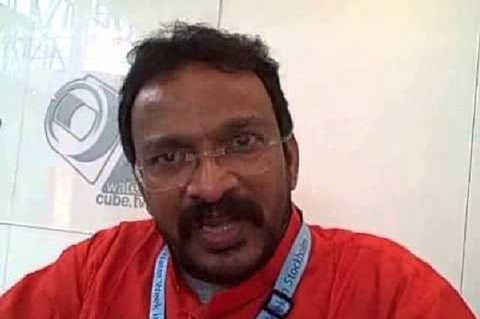

Karnataka born Bezwada Wilson, who has worked to put an end to manual scavenging in India, has won the prestigious Ramon Magsaysay Award for “Asserting the inalienable right to a life of human dignity”.
The announcement was made on Wednesday.
Born in Kolar district in Karnataka, Bezwada watched his family and fellow Dalits clean the dry latrines in the city. As a child and teenager, he was looked down upon because of this background, he told Business Standard.
But while he wanted his community to stop doing this inhuman work, he could not convince them as many Dalits saw it as the source of their livelihood. Eventually, he talked to people about the humiliation that he faced as a child of manual scavengers in the outside world. Beyond questions of livelihood, it was the shared experience of humiliation that struck a chord with many fellow Dalits.
In 1990, he discovered Ambedkar and understood the structure of society. “That's when I understood what had happened to us. I realised we are not doing scavenging because we are illiterate or poor. We are doing it because of the way society is organised,” Bezwada told Business Standard.
The Ramon Magsaysay Award "celebrates greatness of spirit and transformative leadership in Asia" and is given to individuals and organisations that work towards resolution of problems of human development.
Reproduced below, is the citation for the award:
“Manual scavenging is blight on humanity in India. Consigned by structural inequality to the dalits, India’s “untouchables,” manual scavenging is the work of removing by hand human excrement from dry latrines and carrying on the head the baskets of excrement to designated disposal sites. A hereditary occupation, manual scavenging involves 180,000 dalit households cleaning the 790,000 public and private dry latrines across India; 98 percent of scavengers are meagerly paid women and girls. While the Constitution and other laws prohibit dry latrines and the employment of manual scavengers, these have not been strictly enforced since government itself is the biggest violator.
Bezwada Wilson was born to a dalit family in Kolar Gold Fields township in Karnataka state. Although his family had been engaged in manual scavenging for generations, he was spared the labor to be the first in his family to pursue a higher education. Treated as an outcast in school and acutely aware of his family’s lot, Bezwada was filled with great anger; but he would later channel this anger to a crusade to eradicate manual scavenging.
He started by changing the mindsets of his family and relatives – that being a dalit is not their fate but a status imposed by how society has been organized, and that no human being should be made to do such demeaning work as scavenging. In 1986, he sent a complaint about dry latrines to the authorities of their town, and when he was ignored sent the complaint to the Prime Minister, threatening legal action. As a result, the town’s dry latrines were converted into water-seal latrines and the scavengers transferred to non-scavenging jobs.
He boldly moved his crusade to other states, working with dalit activists, recruiting volunteers for what would take shape as a people’s movement of manual scavengers and their children, Safai Karmachari Andolan (SKA). With Bezwada Wilson as national convenor, SKA was launched in 1993 when he initiated the filing of a public interest litigation (PIL) case in India’s Supreme Court, naming all states, union territories, and the government departments of Railways, Defense, Judiciary, and Education as violators of the 1993 Prohibition Act banning dry latrines and the employment of manual scavengers.
SKA vigorously conducted district-level meetings to raise awareness about scavenging, the caste system, and the 1993 Prohibition Act, and trained local leaders and volunteers for the movement. In 2004-2005, it undertook a mass latrine demolition drive across the state of Andhra Pradesh; exposed the occupational violence faced by female scavengers; and met with officials to demand the demolition of dry latrines and the provision of alternative occupations for scavengers. In 2010, SKA led an India-wide march for the total eradication of scavenging, and again in 2015 undertook a 125-day bus journey across 30 states to mobilize the public against manual scavenging. The movement has since made significant progress. In 2013 SKA successfully lobbied for a new law that includes rehabilitation support for scavengers. It lobbied with local authorities for scholarships for children of manual scavengers, and conducted vocational training for scavengers’ daughters to move them into more decent jobs. It is now involved in crafting a new law that provides financial aid for scavengers transitioning to new occupations.